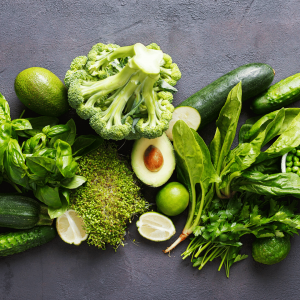You may have decided to follow a plant-based diet because you’re passionate about the environment, animal welfare, or for health reasons. Whatever your reasoning, there’s an overwhelming amount of nutritional advice and opinions for vegetarians to sift through. It’s difficult to know what the best vitamins and multivitamins for vegetarians really are, what you need and what you don’t.
A plant-based diet can meet your nutritional needs, but you must take care to eat a wide variety of nutritious foods every day and take supplements to fill in any nutritional gaps in your diet. That being said, there is evidence that following a vegetarian diet may reduce the risk of some chronic diseases, including Type 2 diabetes, obesity, heart disease, and some types of cancer, so it’s definitely worth the extra effort.
In this guide, we’ll discuss the best vitamins and multivitamins for vegetarians and vegans. You’ll also get a better understanding of which nutrients are hard to get on a plant-based diet. This information will help you review your diet and avoid a nutrient deficiency that could lead to serious health problems in the future. Continue reading to learn how you can commit to a plant-based diet long term without compromising your health.
The Best Vitamins for Vegetarians + Other Nutrients to Consider
If you are on a plant-based diet and consume no animal products at all, you may be deficient in certain essential vitamins, minerals, and other nutrients. Here’s what you need to know.
1. Vitamin B12
B vitamins are necessary for many body functions. B12 is crucial for regulating moods, brain health, cell metabolism, red blood cell production, and DNA synthesis. A deficiency can be serious, leading to irreversible nerve damage, anemia, and fatigue. Although some nutritional yeast and soy products contain small amounts of B12, it’s only found in large amounts in animal products.
The American Journal of Clinical Nutrition released a study in 2003 that showed that 92% of vegans who do not supplement with B12 are seriously deficient. The study also showed that 77% of those who eat milk and eggs, but no other animal products, were still deficient. On the other hand, only 11% of omnivores in this study were deficient.
That makes B12 one of the best vitamins for vegetarians and vegans to supplement with on a daily basis. It should also be noted that the body loses its ability to absorb B12 from food sources as you age, so it’s a good idea for anyone over 50 to take a B12 supplement.
2. Vitamin D
Vitamin D is another essential nutrient for many body functions, including a strong immune system and balancing the hormones. It also required for calcium absorption, which makes it essential for healthy bones and teeth. If you spend lots of time out in the sun, you are probably getting enough Vitamin D. However, according to this study, 77% of Americans are deficient in this essential vitamin.
Since vegetarians and vegans don’t eat eggs, fish, or dairy products, they have very limited food sources that contain Vitamin D. The only other way to get it in a plant-based diet is though fortified cereals and grains. Even worse, many fortified foods contain D2, which is not the most effective form of Vitamin D.
Vitamin D is one of the best vitamins for vegetarians and vegans to take on a daily basis because it’s hard to meet your needs without consuming animal products. When selecting a Vitamin D supplement, look for D3 because it is absorbed more readily by the body than other forms of Vitamin D.
3. Calcium
If you eat lots of leafy greens, you may be getting all the minerals you need. But, if leafy greens aren’t your thing, you could be deficient in certain minerals, like calcium. It’s essential for healthy bones and teeth, cardiovascular health, and muscle function. Many
Calcium can’t be absorbed without Vitamin D, so vegetarians may want to consider supplementing with it anyway, just to be safe. If you’re a coffee or tea drinker, you should also be aware that caffeine interferes with calcium absorption.
4. Iron
Our red blood cells need iron to transport oxygen and nutrients to cells throughout the body. There are two types of iron: heme iron comes from animal sources and non-heme from plant sources. There are many plants that contain non-heme iron, but it’s not as easily absorbed by the body as iron from animal sources.
Plant-based sources of iron include beans, leafy greens, and artichokes. If you are concerned about your iron levels, a blood test at your doctor’s office can tell you if you’re deficient. Too much iron can cause nausea, so it’s a good idea to have your levels checked before you begin supplementing.
5. Zinc
Zinc is another mineral that your body needs but may not be getting enough of on a vegetarian or vegan diet. It’s crucial for cell metabolism and a strong immune system. Every cell in your body requires zinc and it is also a component of hundreds of active enzymes throughout the body’s systems.
On a plant-based diet, you can get zinc by eating legumes, nuts, and seeds. If you don’t eat these foods daily, you should consider taking a zinc supplement. Just be aware that too much zinc can interfere with iron and copper absorption, so be sure to follow dosage instructions and consider all sources of zinc in your diet.
6. Iodine
Many people are deficient in iodine, not just those on a plant-based diet. Iodine is crucial for a healthy thyroid. It’s normally consumed in iodized table salt, but many people have switched to non-iodized sea salt instead. You can also get by eating sea vegetables, but most people don’t consume those regularly either. Not only that, but cruciferous vegetables, soy products, and sweet potatoes can interfere with the absorption of iodine. Too much iodine can be harmful, so you should only supplement with it if you aren’t getting it through your diet.
7. Omega-3s
Vegetarians and vegans are likely to be deficient in essential omega-3 fatty acids because the most prominent source of them is fatty fish. That being said, there are also several plant-based sources of omega-3s, including walnuts, olive oil, and flax, chia, and hemp seeds. Algae is the best plant source of DHA and EPA, which are the two types of omega-3s that come from fish.
Many Americans consume way more omega-6 fatty acids than they do omega-3s, but it should actually be the opposite. Most people will be healthier if they decrease their intake of omega-6 and increase omega-3. One easy way to do this is to consume healthy fats like coconut, avocado, and olive oil.
It’s important to know that the body cannot produce omega-3s on its own, so they must come from the diet. These essential fatty acids are crucial for brain, heart, joint, and metabolic health, so they’re intake is essential for good health. They also help to reduce inflammation throughout the body.
The body can synthesize DHA and EPA from plant-based sources like flaxseed oil, but not efficiently. If you decide to supplement with omega-3s, algae oil is the most efficient form.
The Best Multivitamins for Vegetarians and Vegans
The easiest way to ensure that you are getting all the nutrients you need is to take a vegetarian-friendly multivitamin every day. The best multivitamins for vegetarians will contain vitamins B12 and D as well as trace minerals. Of course, you’ll want to read the product label carefully to ensure that the product is entirely plant-based.
Watch out for these ingredients on your multivitamin label:
- Stearic Acid: This an additive that’s used to keep supplement ingredients from caking up when the multivitamin is being manufactured. It can come from either plant or animal sources, so make sure it says vegetable sourced on the list of ingredients.
- Lanolin: Many supplements use lanolin as the source of Vitamin D3. Lanolin comes from sheep’s wool, so it’s not vegan. Vegan supplements include lichen as the D3 source instead.
- Gelatin: This one is widely used in supplements that are sold in capsule form, and occasionally in gummy vitamins. It can be animal or plant-based, so read the ingredients list carefully. You want it to say veggie caps or v-caps.
If the product you choose doesn’t contain algae oil for omega-3s, consider taking it as a separate supplement. Some multivitamins for vegetarians will also contain probiotics and digestive enzymes, which are great for digestive health and can improve the absorption of nutrients from your food and your supplements.
Some Final Nutrition Tips for Vegetarians and Vegans
Everyone’s diet is different, even plant-based diets. The supplements that are best for you are affected not only by your diet, but also by your lifestyle and activity level. Nutrient deficiencies can have a major impact on your health that may not be noticeable right away but could become severe over time.
Taking an online assessment and choosing a personalized multivitamin pack based on your individual needs can help you meet your specific nutrition requirements. The assessment will take your current diet and lifestyle into account and make recommendations accordingly. Including the right multivitamin in your daily routine will help you stay healthy now and avoid issues in the future.


